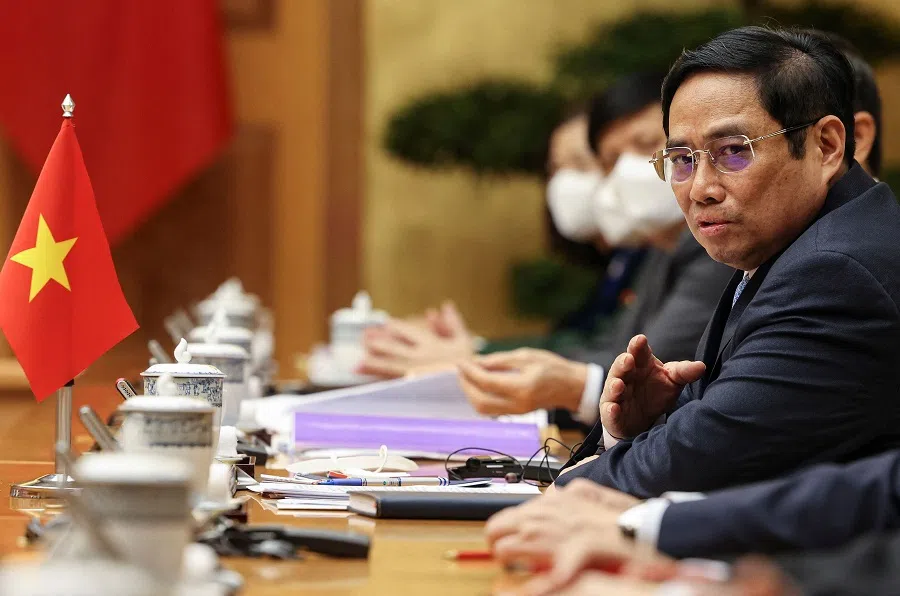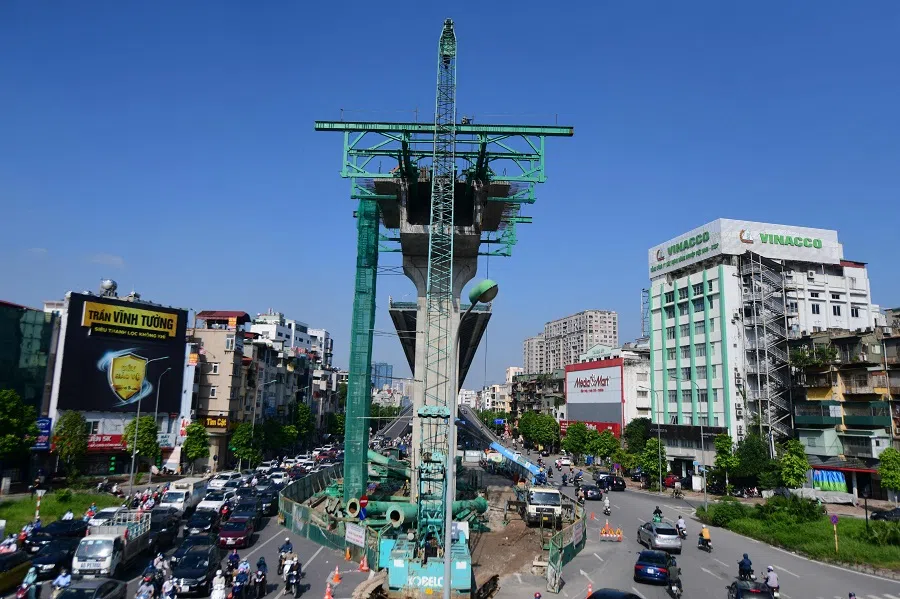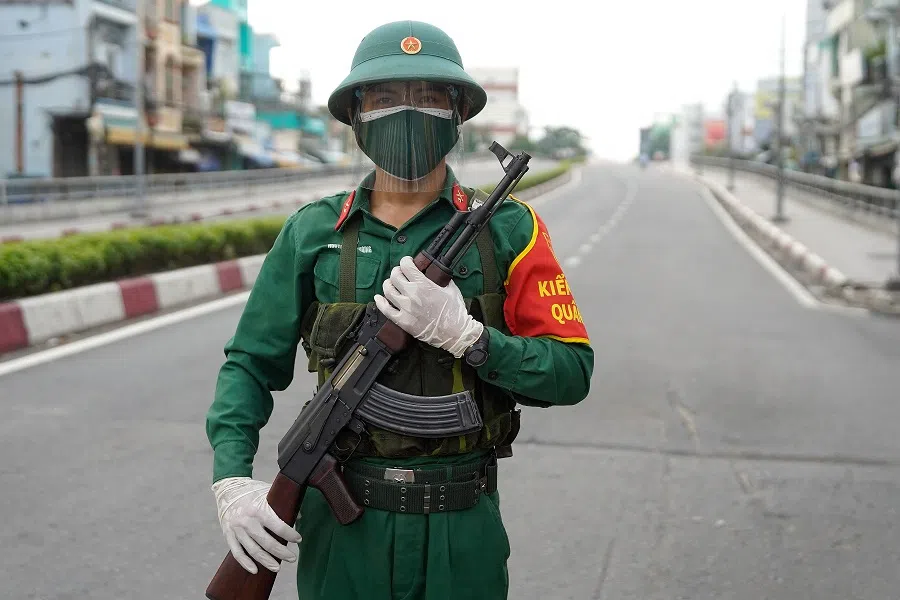Great power rivalry: Why Vietnam is not taking sides
Sokvy Rim explains why Vietnam still chooses to adopt a hedging strategy between the US and China, despite increasing fears of China's aggressive moves in the South China Sea.

The US foreign policy pivot to Asia in 2011 and its creation of AUKUS in 2021 has turned the Southeast Asian region into a hazardous geopolitical battleground for great power rivalry. The US's return received a warm welcome from some Southeast Asian countries, particularly Vietnam and the Philippines, which have large maritime disputes with China in the South China Sea (SCS).
Vietnam, a former foe of the US, has caught the eye of the US as it has the largest overlapping maritime dispute with China in the SCS. Because of its animosity with China and its important strategic location, Vietnam has become the best candidate to help the US suppress China vis-à-vis the SCS.
Vietnam - safest not to take sides
In 2013, the US deepened its relations with Vietnam by forging a comprehensive partnership. In the following years, the US started eliminating the arms embargo on Vietnam until it was completely lifted in 2016. This action not only signalled the deepening of relations and trust between the US and Vietnam but also reflected the US's intention to use Vietnam as an off-shore alliance to counter China's growing influence in Southeast Asia.
The US shifting its attention to Asia benefits Vietnam a lot; however, Vietnam seems to favour its self-reliant foreign policy and a hedging strategy despite China's assertive behaviour in the South China Sea.
Vietnam's approach of not taking sides indicates that it is neither ready to stand openly against China nor to deepen its relations with the US.
Vietnam's approach of not taking sides is clear from Vietnamese Prime Minister Pham Minh Chinh reiterating Vietnam's position of not joining forces against any country to the Chinese ambassador. Vietnam asserted this neutral position shortly before US Vice-President Kamala Harris' visit in 2021 during which she encouraged Vietnam to oppose Chinese aggressive behaviour in the SCS.

Vietnam's approach of not taking sides indicates that it is neither ready to stand openly against China nor to deepen its relations with the US.
States adopt hedging strategies when they hope to leave some fallback position in facing uncertainty. More fundamentally, they also aim to mitigate risks and to prevent an over-reliance on a particular superpower. Vietnam's intention in opting for a hedging strategy is to avoid the dangerous consequences resulting from the uncertainty of great power rivalry between the US and China in the SCS. It also allows Vietnam to gain from this great power competition.
Risk mitigation
Vietnam foreign policy revolves around the SCS issue as China appears to be the greatest threat to Vietnam. This concern is expressed implicitly in its defence white paper 2019 which states:
"New developments in the East Sea [South China Sea], including unilateral actions, power-based coercion, violations of International law, militarization, change in the status quo, and infringement upon Viet Nam's sovereignty, sovereign rights, and jurisdiction as provided in international law, have undermined the interests of nations concerned and threatened peace, stability, security, safety, and freedom of navigation and overflight in the region."
Though the statement does not state directly which superpower, it clearly refers to China as the latter frequently harasses and encroaches on Vietnam's waters. For instance, in 2014, China oil rig HYSY-981 entered Vietnam's Exclusive Economic Zone (EEZ) for 75 days which led to the rise of anti-China sentiment in Vietnam. In 2019, a Chinese survey ship and escort ships entered Vietnam's EEZ again which led to the confrontation with a Vietnamese coastguard vessel. These are a few of the many incidents that exemplify the ongoing harassment and bullying behaviour which has been taking place in Vietnam's territorial waters.
China and Vietnam have a comprehensive strategic cooperative partnership, the highest level of a strategic partnership that Vietnam undertakes.

China's assertive behaviours and its infringement on Vietnam maritime sovereign rights should have pushed Vietnam closer to the US because the two countries have convergent interests of maintaining freedom of navigation and to prevent Chinese domination in the SCS. However, Vietnam seems to be eschewing this logic as it still tries to maintain its deep ties with China and show no further sign of developing deeper security ties with the US.
The official designation of Vietnam's relations with the two countries can serve as an indicator. China and Vietnam have a comprehensive strategic cooperative partnership, the highest level of a strategic partnership that Vietnam undertakes. Its partnership with the US is a comprehensive partnership, which is of a far lower level. The level of partnership implies the degree of trust and cooperation which Vietnam has with the two countries.
Between a rock and a hard place
There are two reasons to explain Vietnam's trend of relations with the US and China. First, suspicions of the US intention to change the Vietnamese regime from a communist one to a democratic system.
The US frequently criticises human rights violations and political freedom in other ASEAN countries and Vietnam is no exception. During Kamala Harris's recent visit, for instance, while stressing security concerns in the region, Harris also criticised Vietnam for its severe oppression of journalists and activists.
Vietnamese leaders are afraid that the US might try to change its political system and support domestic opposition when the US has received some level of security dependency from Vietnam. It is worth noting as well that Vietnam's 2019 defence white paper also raises concerns about domestic threats such as domestic opportunists and opposition groups that aim to destroy the leading role of Communist Party of Vietnam.
Over-dependence on the US can jeopardise the survival of Vietnam's Communist Party while dependence on China would affect its territorial integrity in SCS.
Secondly, it would be very risky for Vietnam to develop security ties with the US as it could antagonise China, its giant neighbour, who has superior military and economic power. This might explain as well why Vietnam is so reluctant to elevate its relations with the US to a strategic partnership level despite the frequent insistence from the US. On top of that, the US's commitment to Vietnam is still questionable, especially in terms of ensuring Vietnam's security in times of high tension in the SCS.

Against this backdrop, maintaining good relations with both superpowers and avoiding over-reliance on these two countries would appear to be the best strategic option for Hanoi. Over-dependence on the US can jeopardise the survival of Vietnam's Communist Party while dependence on China would affect its territorial integrity in SCS.
Opportunities
While a hedging strategy allows Vietnam to avoid unintended consequences resulting from great power rivalry between Washington and Beijing, Vietnam can also benefit economically from the two superpowers.
Currently, China is Vietnam's largest trading partner, with a turnover of US$107 billion in 2018. Chinese foreign direct investment (FDI) in Vietnam also increased dramatically, from US$700 million in 2011 to US$1.4 billion in 2017. Chinese FDI reached US$2.28 billion in 2019 which constitutes 15.5 % of total FDI in Vietnam.
The trend of Vietnam-China economic relations seems to suggest that Vietnam will continue to benefit economically from China as long as it maintains the appearance of not joining forces with the US. Any intention to antagonise China would disrupt economic relations between the two countries, resulting in economic losses for Vietnam who has high economic dependence on China.
China has a history of weaponising its trade relations with other countries. For instance, in 2010, China suspended its rare earth supplies to Japan following the growing tension in the Senkaku/Diaoyu islands. The same approach could be used by China when there is a growing tension between Vietnam and China in the SCS.
...the hedging strategy not only allows Vietnam to mitigate the risks stemming from the US-China rivalry, but also makes it possible for Vietnam to gain economic benefits from both superpowers.
While Vietnam-China trade relations are on a positive trend, the US has also become Vietnam's largest export market with its trade turnover reaching US$ 90.8 billion in 2020. US FDI and trade relations between the two countries will keep growing as long as Vietnam remains on the sidelines. The US hopes its economic influence on Vietnam would help to push Vietnam to join its cause and put more pressure on China.
Hence, the hedging strategy not only allows Vietnam to mitigate the risks stemming from the US-China rivalry, but also makes it possible for Vietnam to gain economic benefits from both superpowers. Any risky move in taking sides either with the US or China will not only make Vietnam lose economic benefits but also pull itself into the great power politics.
Related: Vietnam needs to do more to reduce trade dependence on China | What Vietnam and China want from each other amid strengthening Vietnam-US ties | Feisty and delicate: Vietnam's approach to handling great power rivalry | How Vietnam is leveraging anti-China sentiments online | Facing frenemy China, Vietnam shall edge closer to America



![[Big read] When the Arctic opens, what happens to Singapore?](https://cassette.sphdigital.com.sg/image/thinkchina/da65edebca34645c711c55e83e9877109b3c53847ebb1305573974651df1d13a)

![[Video] George Yeo: America’s deep pain — and why China won’t colonise](https://cassette.sphdigital.com.sg/image/thinkchina/15083e45d96c12390bdea6af2daf19fd9fcd875aa44a0f92796f34e3dad561cc)